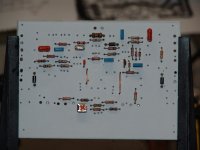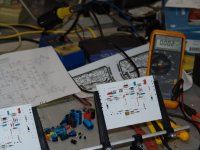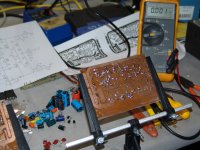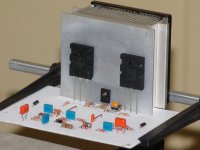I decided to build an amplifier with parts ready available, that is, reused from computer monitors, PSU, UPS, and some others from my parts bin. The results will be shown here. But the question is: how nice will be the sound quality? Will it last for a long time? Which are the most critical ones that should not be reused? Feel free to post your comments, they are all welcome!
did the same expiramnet with my P3A none of the parts i used was used but i used the lower quality available cheap carbon resistors all transistors chinese not matched fake 1943-5200 and ceramics everywhere
the amplifier is working still after produced two years ago works daily 8-10 hours in a lofi application but perfomance is terrible compaired to the standard "high quality " P3a
regards sakis
the amplifier is working still after produced two years ago works daily 8-10 hours in a lofi application but perfomance is terrible compaired to the standard "high quality " P3a
regards sakis
It depends on how clever you are and what equipment you have available. No doubt a wonderful amplifier could be build, but you'd need to characterize devices with a curve tracer, find breakdown voltages and such, for all the "house number" parts used in commercial equipment. Some of the capacitors used in switching supplies are probably good, but I wouldn't use any of the resistors found in inexpensive consumer equipment for audio. It's way cheaper and easier to buy the right parts unless you like scavenger hunts!
Conrad
Conrad
Here are some pictures:
An externally hosted image should be here but it was not working when we last tested it.
An externally hosted image should be here but it was not working when we last tested it.
An externally hosted image should be here but it was not working when we last tested it.
An externally hosted image should be here but it was not working when we last tested it.
I cant open your pictures
Sorry, I'll try to fix that.
Hm,
well, that transistor 2SC5200 on the left isn't genuine Toshiba's. You can still use it but don't expect high performance.
Thanks, I suspected that, since both doesn't have the same logo and marks.
Regards,
Max.
I have done it with junk parts. Monitors sometimes yield some nice goodies but most of the ideal transistors here have been replaced with IC's. The hardest thing to get is some medium power (like TO-126 package) devices suitable for VAS use.
Older midi/mini hifi systems are a good grab. They often have discrete output stages, usually based on some Sanken darlingtons. The new ones typically have an STK hybrid IC of some kind, but can still yield useful parts.
Be warned - recycling old electronics will drive your wife/girlfriend/partner crazy!
Older midi/mini hifi systems are a good grab. They often have discrete output stages, usually based on some Sanken darlingtons. The new ones typically have an STK hybrid IC of some kind, but can still yield useful parts.
Be warned - recycling old electronics will drive your wife/girlfriend/partner crazy!
Semiconductors, resistors, and capacitors are so inexpensive it's foolish to recycle.
I wouldn't really call it foolish. I know what you mean but basically, if you can pull things out without too much effort (e.g. power transistors and alike) there's no point of not using them, unless they, as devices, are inferior in comparison to everything else you can acquire easily.
Some power MOSFETs, those big Sankens with integrated diodes, some old driver and special-function IC's etc. can be hard to get locally and you have to order them, wait around for a package to be delivered and then pay extra for all this. You likely have to make some kind of a (not so inexpensive) minimum order to make all that worthwhile financially. Some of the stuff you can cannibalize from old equipment is simply made no more and is rather unobtainable in other ways.
But yep, no point pulling off run-of-the-mill 1/4W resistors and cheap, possibly rather aged caps that you can buy dozens with few bucks.
Indeed. As well as potentiometers (some old stereos have very good quality stereo ones and possibly even motorised pots), switches, jacks, wire, and so on.Transformers, heatsinks, and chassis metal-work recycle quite nicely.
Be warned - recycling old electronics will drive your wife/girlfriend/partner crazy!
now .... that sounds like Jaycee is talking from personal expirience .... i smell a screaming wife ha ha ha ha ha
my shop is 130sq meters big .... but to be able to support all the things we do we also have another place which is something between a stock room and a scrap yard and that is another 200 sqmeters
in my country a "local repair shop " is totaly 50 square meters ...
now .... that sounds like Jaycee is talking from personal expirience .... i smell a screaming wife ha ha ha ha ha
my shop is 130sq meters big .... but to be able to support all the things we do we also have another place which is something between a stock room and a scrap yard and that is another 200 sqmeters
in my country a "local repair shop " is totaly 50 square meters ...
For scrap gear that will yeild useful parts, I used to always go to the differing repair depots and asked them for the gear that they claimed was 'unrepairable' (to expensive to fix or they could not do it) and take those items home.
As an example, in this way, I received the Pioneer SA-9800, SA-9900, SX-1250, SX-1280, technics SA-800, SA-900, SA-5770, SL-1500, 1300, 1400, SU-V8, SU-V9, etc, etc....Kenwood KA-8100, KA-9100, KD-500, KD-600, Linn LP-12, Kenwood KR-9600, Teac 3440A (15ips), Sansui receivers too numerous to remember, Yamaha CT-7000, CR-2010, 1010, Almost every integrated Yamaha made in the early 80's to the late 70's, Numerous Rotels, 3 of the mission power amps/integrateds, including the battery preamp, Even a Luxman M-05, Luxman C-05, and ton of other stuff.
Most of it for free, and some I had to pay a few dollars for.
All because I put in the effort of knowing the local repair people in the 1990's, when all of this sort of gear was coming in for repairs, and some times it could not be repaired at a financially good point for the owners of the gear. They elected, many times, to forgo repairs and just buy something else. So I ended up with the scraps.
Become friends with your local audio repair people. Help them when you can. They will reward you in kind.
As an example, in this way, I received the Pioneer SA-9800, SA-9900, SX-1250, SX-1280, technics SA-800, SA-900, SA-5770, SL-1500, 1300, 1400, SU-V8, SU-V9, etc, etc....Kenwood KA-8100, KA-9100, KD-500, KD-600, Linn LP-12, Kenwood KR-9600, Teac 3440A (15ips), Sansui receivers too numerous to remember, Yamaha CT-7000, CR-2010, 1010, Almost every integrated Yamaha made in the early 80's to the late 70's, Numerous Rotels, 3 of the mission power amps/integrateds, including the battery preamp, Even a Luxman M-05, Luxman C-05, and ton of other stuff.
Most of it for free, and some I had to pay a few dollars for.
All because I put in the effort of knowing the local repair people in the 1990's, when all of this sort of gear was coming in for repairs, and some times it could not be repaired at a financially good point for the owners of the gear. They elected, many times, to forgo repairs and just buy something else. So I ended up with the scraps.
Become friends with your local audio repair people. Help them when you can. They will reward you in kind.
Member
Joined 2009
Paid Member
I decided to build an amplifier with parts ready available, that is, reused from computer monitors, PSU, UPS, and some others from my parts bin. The results will be shown here. But the question is: how nice will be the sound quality? Will it last for a long time? Which are the most critical ones that should not be reused? Feel free to post your comments, they are all welcome!
Yes. It's fun too. I think that anyone can build a high end amp using brand new high end parts. Given enough money you can do very well.
But it's more of a chanange to look at a pile of re-cycle and build with that. When you do the first step is NOT to select the project requirements but to look at the parts and say "What can I build?" and lets the available pats define the project.
That said, building with recycled parts makes a lot more sense with tube amps then with small solid state amps. And it makes even less sense to pull old chip amps out of TV sets and recycle the $2 part.
The only parts that degrade with time are capasitors. I don't re-use those unless it is just a breadboard experiment.
Computer power supplies are a great source of high voltage filter caps, small heat sinks and AC main filter components.
But if you are going to dismantle something find something with expensive parts inside. I have been buying junk Hammond organ equipment for scrap prices, $30 to $50. and inside are many good transformers (both audio and power) and the last one has 20 good preamp tubes.
The good thing about old parts is that they are unlikely to be fakes.
Sure... good old times! No need to be afraid!
The good thing about old parts is that they are unlikely to be fakes.
Sure... good old times! No need to be afraid!
we need a time machine.
I live in California. We have a fairly recent law that says that old electronics can no longer be placed in the normal trash and put in a landfill. Reason being that most of this stuff has toxic materials like lead that will leach into the ground and water supply. So it must to disposed up through a recycler.
recycling is a bit of a hassle for most people. So you can get any amount of electronic junk now simply by offering to take it away. Then you pick through the junk and dump the remaining 99% of it at the local recycle yard. I've cut up old CRT computer monitors just for the large ferric toroids and hookup wire inside. I found that Sony used some good quality aluminum boxes inside and one brand of cable TV box has a nice chassis that is easy to re-use
The new law has made non-working electronics have a negative value so if you offer zero, people are happy.
I'm quite brutal with disassembly. I prefer a pry bar to a screw driver and will shatter a plastic case rather then spend the time to take out 15 screws. Also I find a propane torch is much faster than the solder iron to remove parts from a PCB. The torch heats the solder so fast that it melts before the part gets hot and mostly I can use my fingers to pull the part off. Even those 11 pin IC audio amps unsolder in about 4 seconds with a propane torch. The trick is not to spend to much time or bother with the low value parts
recycling is a bit of a hassle for most people. So you can get any amount of electronic junk now simply by offering to take it away. Then you pick through the junk and dump the remaining 99% of it at the local recycle yard. I've cut up old CRT computer monitors just for the large ferric toroids and hookup wire inside. I found that Sony used some good quality aluminum boxes inside and one brand of cable TV box has a nice chassis that is easy to re-use
The new law has made non-working electronics have a negative value so if you offer zero, people are happy.
I'm quite brutal with disassembly. I prefer a pry bar to a screw driver and will shatter a plastic case rather then spend the time to take out 15 screws. Also I find a propane torch is much faster than the solder iron to remove parts from a PCB. The torch heats the solder so fast that it melts before the part gets hot and mostly I can use my fingers to pull the part off. Even those 11 pin IC audio amps unsolder in about 4 seconds with a propane torch. The trick is not to spend to much time or bother with the low value parts
Super! Thank you very much for the invaluable hints!
Maybe in the near future this will be transformed into a project to teach Electronics to less fortunate children, or even children from the streets. What about get some amps from learning? When desoldering, parts must be tested, measured, stored by value and characteristics... Then you have to select what to build from the parts you have... There are infinite possibilities! Thank you again!
Regards,
Max.
Maybe in the near future this will be transformed into a project to teach Electronics to less fortunate children, or even children from the streets. What about get some amps from learning? When desoldering, parts must be tested, measured, stored by value and characteristics... Then you have to select what to build from the parts you have... There are infinite possibilities! Thank you again!
Regards,
Max.
- Status
- This old topic is closed. If you want to reopen this topic, contact a moderator using the "Report Post" button.
- Home
- Amplifiers
- Solid State
- Is it possible to build a good amplifier out of junk parts?



